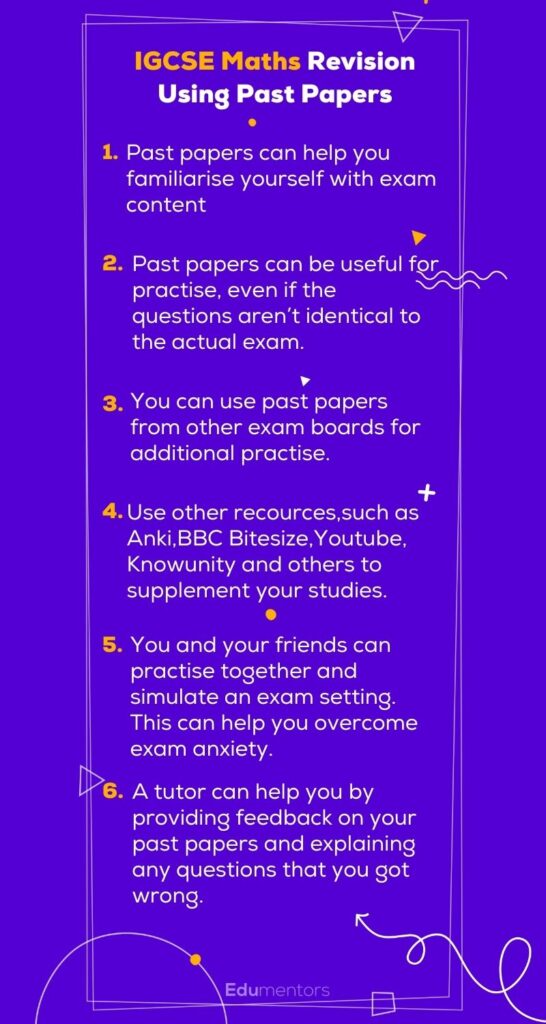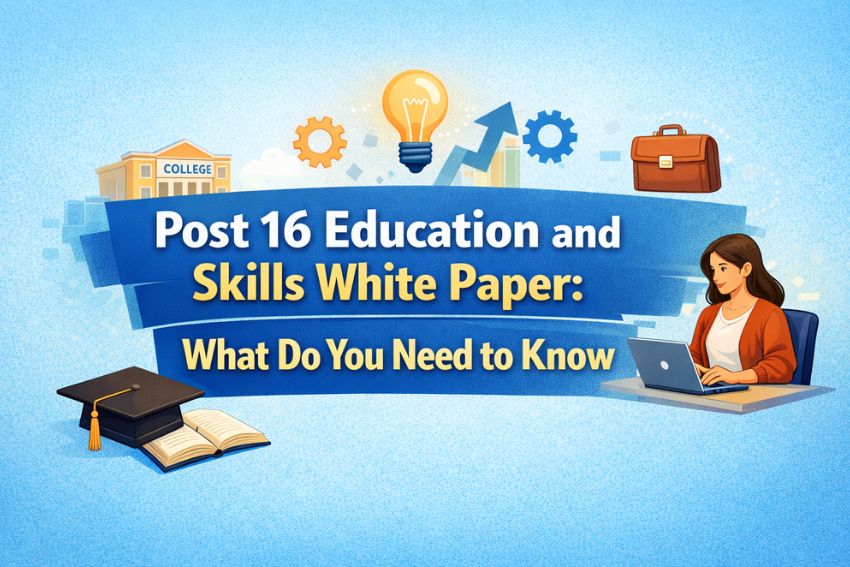Feeling nervous about your IGCSE Maths exam? You’re not alone! But here’s the good news-practising with past papers is one of the best ways to improve your results! By working through real exam questions, you’ll get used to the format, spot common question patterns, and strengthen your problem-solving skills.
To make this easy for you, we’ve gathered list of IGCSE Maths past papers. Whether you’re aiming for a top grade or just want to feel more prepared, past papers can make a huge difference.
Table of Contents
IGCSE Maths: Cambridge International Core
Here, we offer you list of Cambridge IGCSE Maths past papers.
Paper 11
Paper 12
Paper 13
Paper 31
Paper 32
Paper 33
Cambridge International IGCSE Maths Extended
Paper 21
Paper 22
Paper 23
Paper 41
Paper 42
Paper 43
Edexcel IGCSE Maths Past Papers – Foundation Tier
Paper 1F
| Question Paper | Mark Scheme |
| June 2018 | June 2018 |
| January 2019 | January 2019 |
| June 2019 | June 2019 |
| November 2020 | November 2020 |
| November 2021 | November 2021 |
| January 2022 | January 2022 |
Paper 1FR
| Question Paper | Mark Scheme |
| June 2018 | June 2018 |
| January 2019 | January 2019 |
| June 2019 | June 2019 |
| November 2020 | November 2020 |
| January 2022 | January 2022 |
Paper 2F
| Question Paper | Mark Scheme |
| June 2018 | June 2018 |
| January 2019 | January 2019 |
| June 2019 | June 2019 |
| November 2020 | November 2020 |
| November 2021 | November 2021 |
| January 2022 | January 2022 |
Paper 2FR
| Question Paper | Mark Scheme |
| June 2018 | June 2018 |
| January 2019 | January 2019 |
| June 2019 | June 2019 |
| November 2020 | November 2020 |
| January 2022 | January 2022 |
Edexcel IGCSE Maths Past Papers – Higher Tier
Paper 1H
| Question Paper | Mark Scheme |
| June 2018 | June 2018 |
| January 2019 | January 2019 |
| June 2019 | June 2019 |
| November 2020 | November 2020 |
| November 2021 | November 2021 |
| January 2022 | January 2022 |
Paper 1HR
| Question Paper | Mark Scheme |
| June 2018 | June 2018 |
| January 2019 | January 2019 |
| June 2019 | June 2019 |
| November 2020 | November 2020 |
| January 2022 | January 2022 |
Paper 2H
| Question Paper | Mark Scheme |
| June 2018 | June 2018 |
| January 2019 | January 2019 |
| June 2019 | June 2019 |
| November 2020 | November 2020 |
| November 2021 | November 2021 |
| January 2022 | January 2022 |
Paper 2HR
| Question Paper | Mark Scheme |
| June 2018 | June 2018 |
| January 2019 | January 2019 |
| June 2019 | June 2019 |
| November 2020 | November 2020 |
| January 2022 | January 2022 |
Use IGCSE Maths Past Papers for Revision

FAQs About IGCSE Maths
What is IGCSE Maths?
IGCSE Maths refers to the International General Certificate of Secondary Education (IGCSE) Mathematics program, which is a comprehensive curriculum designed for students aged 14-16. It’s one of the most popular qualifications and it’s recognised by universities and employers globally.
The IGCSE Maths covers a wide range of topics, including algebra, geometry, trigonometry, probability, and statistics. IGCSE Maths is offered by various exam boards, such as Cambridge Assessment International Education, Pearson Edexcel, and Oxford AQA. Students who complete IGCSE Maths usually take an exam at the end of the course to earn a certificate.
Who is IGCSE Maths for?
IGCSE Maths helps students develop their Maths skills and knowledge. It suits those interested in further studies in Maths or related fields and those who want a strong foundation to support other subjects.
What is covered in the IGCSE Maths syllabus?
The IGCSE Maths syllabus covers a lots of topics and skills. Students will learn about basic concepts such as arithmetic operations, equations, graphs, and measurements. They will also explore more advanced topics such as quadratic equations, coordinate geometry, calculus, and data analysis.
What are the benefits of studying IGCSE Maths?
Studying IGCSE Maths can offer several benefits to students. Some of the benefits of studying IGCSE Maths are:
- Strong Foundation in Maths – IGCSE Maths builds a solid foundation, essential for students pursuing Mathematics, Science, or Engineering in the future.
- Problem-Solving Skills – The syllabus includes a variety of mathematical problems, helping students develop logical thinking and analytical skills.
- Higher Employability – Strong numeracy skills from IGCSE Maths can boost job prospects in finance, engineering, and data analysis.
- Globally Recognised Qualification – Universities and employers worldwide recognise IGCSE Maths, opening doors to study or work abroad.
- Preparation for Advanced Exams – It lays the groundwork for higher-level exams like A-Levels, IB, or AP, required for entry into top universities.
How is IGCSE Maths assessed?
IGCSE Maths is assessed through a combination of internal and external assessments. The internal assessments are carried out by the teacher and are usually in the form of coursework or practical assessments. The external assessments are set and marked by the Cambridge Assessment International Education board. There are two external assessment components in IGCSE Maths :
Written examination: Divided into two papers, each lasting 2 hours.
Non-exam assessment: Practical assessment that requires students to solve problems using their mathematical skills and understanding.
The written examination contributes 80% to the overall grade, while the non-exam assessment contributes the remaining 20%.
What's the difference between GCSE maths and IGCSE Maths?
The main difference between IGCSE Maths and GCSE Maths is their assessment structure. GCSE examiners primarily assess Maths through terminal exams, while IGCSE exams include coursework, practical assessments, and written exams.
Additionally, IGCSE Maths is designed to be more internationally recognised and flexible in terms of curriculum, allowing for more options in terms of subject choices and assessments. Furthermore, IGCSE Maths often includes a wider range of mathematical concepts and applications compared to GCSE Maths, making it a more comprehensive for students interested in pursuing higher-level studies in Maths.
How can I prepare for IGCSE Maths?
Preparing for IGCSE Maths can be a challenging task, but with the right approach, you can make a big progress. Here are some tips on how to prepare for IGCSE Maths:
- Familiarise yourself with the syllabus: Go through the topics covered in the syllabus and understand the concepts, formulas, and equations.
- Practise: IGCSE Maths requires a lot of practise. Do as many practise questions as possible, and work through past papers to understand the exam format and types of questions.
- Seek help when needed: If you encounter any difficulties with a concept or topic, seek help from your teacher, IGCSE tutor, or classmates.
- Stay organised: You can be organised by keeping track of your notes, practise questions, and progress. Create a study schedule that works for you and stick to it.
- Use resources: Online sources such as revision guides, and other educational websites to supplement your learning.
- Take breaks: You need breaks to avoid burnout and give your brain a chance to rest and recharge.
Can I take IGCSE Maths as a private candidate?
Yes, you can take IGCSE Maths as a private candidate. Private candidates are students who are not enrolled in a school or educational institution and choose to take the exams independently. However, there may be certain requirements and procedures that you need to follow depending on the exam board and the country where you are taking the exams.
To take IGCSE Maths as a private candidate, you may need to register with the appropriate exam board, pay the exam fees, and find a test center where you can take the exams. It is important to research and understand the requirements and procedures for private candidates in your specific situation to ensure a smooth registration and exam-taking process.
What are the entry requirements for IGCSE Maths?
The entry requirements for IGCSE Maths may vary depending on the exam board or institution offering the qualification. However, there are no formal entry requirements for IGCSE Maths. Students who wish to take the exam are expected to have a good understanding of basic Maths concepts, as well as proficiency in the English language, as the exam is in English.
It is important to note that some institutions or exam boards may have specific requirements or recommendations, such as a minimum age limit or completion of certain prerequisite courses. It is recommended to check with the institution or exam board offering the qualification for their specific entry requirements.








